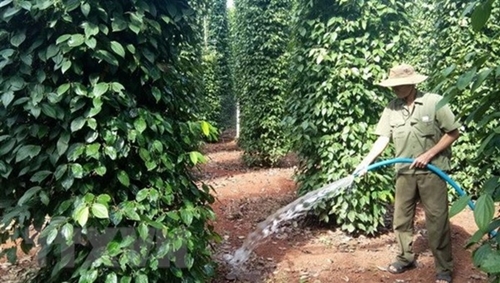The country is one of the world’s leading pepper producers and exporters, making up more than 40 percent in the global volume and 60 percent in the global value. However, the domestic pepper sector has yet to develop sustainably.
    |
 |
|
Vietnam is one of the world’s leading pepper producers and exporters. (Photo for illustration) |
Statistics reveal that in 2018, the country exported 232,000 tons of pepper valued at 758.8 million USD, down 32.1 percent in value as compared with the previous year.
In 2016, Vietnam shipped abroad 176,600 tons of pepper and earned a record 1.42 billion USD, up 12.9 percent value year-on-year. Although the volume increased to 214,000 tons in 2017, the value dropped 21 percent to 1.11 billion USD.
The MARD said the world needs around 510,000 tons of pepper each year. The demand increases only 2-3 percent while the global pepper output goes up 8-10 percent annually.
According to the Export-Import Department under the Ministry of Industry and Trade, 2019 continues to be a tough year for the domestic pepper sector as prices will remain low while production cost is expected to rise at least 10 percent against that in 2017.
In the first eight months of 2019, Vietnam’s pepper export volume reached 224,000 tons, up 27.9 percent over the corresponding time last year, but its value slid 2.1 percent to 571 million USD.
Experts pointed out the unsustainable pepper development in Vietnam, with the total area amounting to 149,800 hectares, nearly 100,000 hectares higher the number set in the planning scheme.
Besides, Vietnam mainly exports crude pepper and only joins the low-end segment, they said.
In that context, the free trade agreements Vietnam has recently signed such as the Comprehensive and Progressive Agreement for Trans-Pacific Partnership (CPTPP) and the EU-Vietnam Free Trade Agreement would offer opportunities for Vietnam to expand pepper export.
Tran Quoc Toan, deputy head of the Export-Import Department, said nine out of the 11 CPTPP members, namely Australia, New Zealand, Canada, Malaysia, Singapore, Brunei, Chile, Peru, and Japan, have committed to immediately lifting duties on pepper.
Among the CPTPP members, only Malaysia is a major pepper producer. However, it makes up just 3 percent of the global volume.
Under the EVFTA, EU countries also pledged to remove tax on pepper right after the agreement takes effect, thus facilitating the export of Vietnamese pepper to these nations.
Nguyen Nam Hai, President of the Vietnam Pepper Association, suggested businesses learn about these agreements, especially information about tax incentives and product quality and origin requirements.
The domestic pepper sector should reform its growth model, focusing on product quality, he added.
Experts also stressed the need for the local pepper sector to develop a sustainable supply chain, improve its value chain and address issues regarding the use of chemicals in production.
Source: VNA